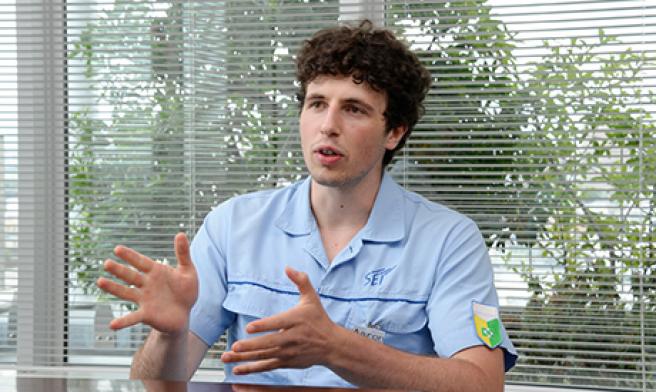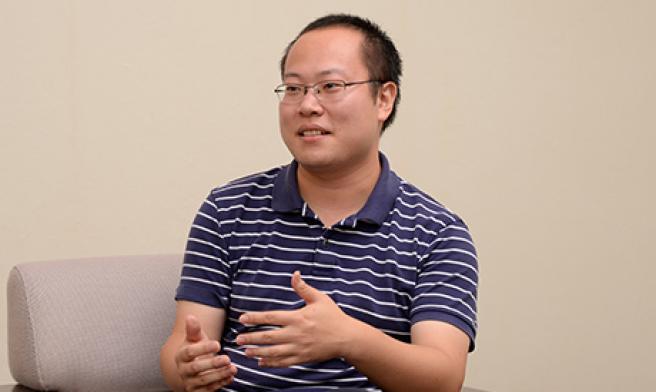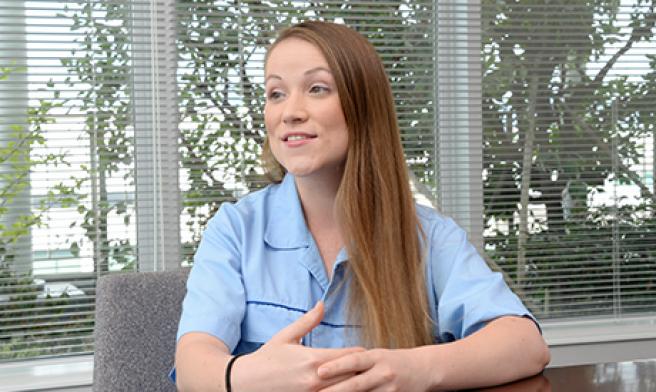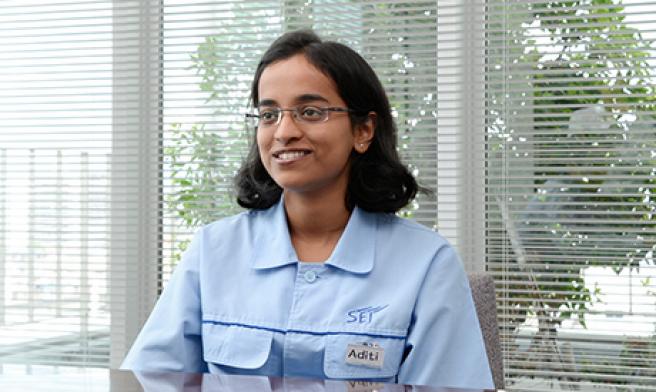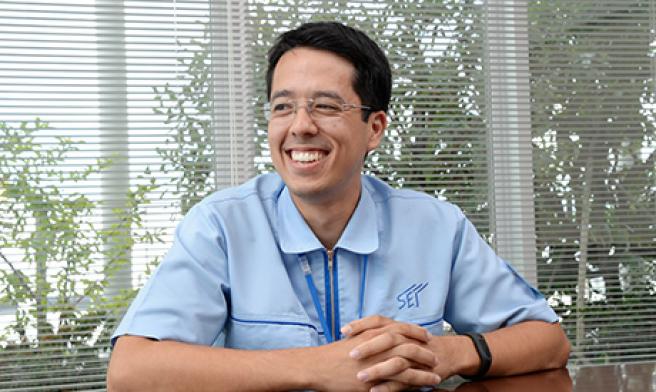
INTERVIEW
Psychology
Intern at Human Resources Development Department
In the Human Resources Development Department, Global Planning Group, my work revolves around training and development, but with a global focus. To give you a more concrete understanding, let me give you a glimpse of the various projects I am involved in.
The most interesting project I have been given a chance to be a part of is the International Employees Support Project. Together with a committee of Japanese and international employees spanning across various HR departments, we work on providing better support to international employees working in Japan through the functions of each HR department. Since my department (Human Resources Development, Global Planning) mainly deals with training, we do our part for international employees by creating various training programs. For example, in 2018, my department had its first run of the Japanese Working Culture Training to better prepare international employees for cultural differences. In early 2019, two of my colleagues and I worked on a newly launched Global Mindset Training program aimed at Japanese technical employees working in the factories. This program aims to plant a seed of cross-cultural awareness in the minds of Japanese employees who have had very little international exposure, in preparation of working together with international employees in future. As we move forward, we are also looking for ways to improve older training programs – such as rethinking how we structure our Japanese Language training program with an increasing number of international employees.
Another interesting project I work on is the Global Common Knowledge Project. After years of developing various training programs, SEI University has come to a point where we have a plethora of programs. However, these programs are not uniformly implemented throughout all our global branches, and the training areas are likely still lacking in breadth. The problems that this project tries to solve are: 1) [outside Japan] The gap between amount of training programs available to group companies within Japan and that available to companies outside of Japan and 2) [within Japan] The need to increase variety of training areas covered by our current training structure. In addition, it is becoming increasingly apparent that SEI has to reconsider talent competency development (knowledge and skills) in order to survive global competition. To do that, we research into and define the common Knowledges, Skills, Abilities and Other characteristics (KSAOs) that all employees of a certain position should possess. The identification of these KSAOs will solve the above two problems. First, overseas group companies can then use the knowledge structure to close the local training gap with that available in Japan. Second, we will then be better able to identify overlaps and gaps, aiding in the removal of excessive programs or the creation of new training areas.
Apart from the newer projects I have talked about, there are also projects that have already been in motion for years. For example, I was recently assigned to support with a management training program that is held twice a year in various regions around the world.
I joined the Global Internship Program two years prior for two reasons: Because I wanted global exposure beyond the shores of the little island of Singapore, and because I saw potential in being able to apply the wisdom I have gained from my psychology degree in making a meaningful change to a company that seeks to grow. Two years later, I joined the company as a full-time employee for more or less the same reason. Although I completed my assigned projects and left the company with various suggestions and ideas two years ago, I felt like there was still much room for growth and change. In terms of the issue on Diversity and Change Management for example, it felt like the company was in its initial stages of development in various ways. It is thus exciting to come back to continue working with my team to make SEI a more hospitable place for international employees. The team and project members I work with are all rather open-minded, extremely kind and driven people – making it a joy to work with and learn from them. Yet, returning as a full-time employee, I have learnt that a lot of patience is needed – especially as someone who comes from a culture that is fast-paced when it comes to adapting to change. While it is good to be idealistic and creative, characteristically-Japanese bureaucratic constraints and resistance to progressive change is not uncommon. Personally, I strive to remain hopeful that the various challenges will amount to fulfilling contributions to the organization, as well as personal growth. Despite the challenges, I am fortunate to be surrounded by team members who have been nothing short of incredibly understanding, sincere and considerate of my circumstances. Ultimately, it is the meaningful little exchanges with these interesting people around me, and the various wonderfully pristine sides of Japanese culture that constantly reenergizes me to continue with my efforts in helping transforming the organization into a truly diverse and global one.

Can you tell us a little about the people that you work with?
My department is divided into a group that deals with local projects and one that handles global projects. I belong to the latter group. I would say we are a pretty interesting mix of individuals that work well together as a team. Out of the 7 of us, 2 of us are international employees – Singaporean and Chinese. Out of the remaining 5 Japanese members, everyone has spent some time overseas either for work or personal reasons. It is not just the various nationalities on this team, but also the different backgrounds and way of thought each person has that makes this team a uniquely diverse one in a Japanese company that is otherwise rather homogenous. Because we have all been exposed to similar challenges of living abroad for a long duration, I think we are all kindred spirits in that aspect. I am really happy to be working with these people on a daily basis! Something interesting about Japanese companies is that there are regular (at least twice a year) shifts in manpower throughout the organization, across departments and countries. So someone seated next to you might suddenly get switched to somewhere across the world, or switched into a department dealing with completely different tasks with about 2 weeks’ notice. This actually happened to the colleagues around me, too. My mentor from the Global Internship Program who I developed a trusting working relationship with abruptly got transferred to another department (fortunately still within the same floor of the same building) just short of 3 months of my arrival. A colleague of around the same age that I got to know on better terms also got transferred to become a trainee in Mexico at around the same time. While frequent goodbyes like these are tough, it exposed me to unique aspects of Japanese working culture. And since another similarly outstanding individual was transferred to my department in place of my previous mentor, I am now also able to get to work with someone of an interesting career background. Such shifts are an interesting way to stimulate work processes through putting people of different career histories together, and also a good shuffle to broaden employees’ professional and social networks. In all, I work with some sincere, dedicated and interesting professionals who have no qualms about guiding me along, making my transition into Japan and into a working adult a smoother and more enriching one.

